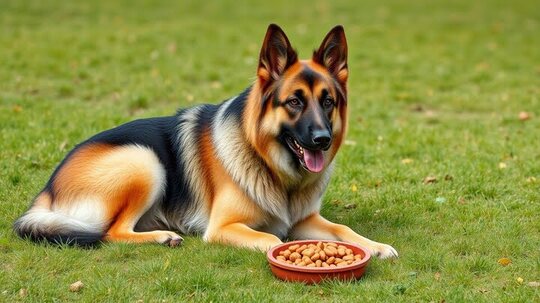Keeping Your Tiny Dog Healthy and Happy
Toy dog breeds, such as Chihuahuas, Pomeranians, and Yorkies, may be small in stature, but they have big personalities and unique nutritional needs. As a dog owner, you’ve likely noticed that your pint-sized pup is full of energy, and keeping them healthy involves paying close attention to their diet. These tiny companions may need less food overall than their larger canine cousins, but what they do eat needs to pack a punch.
In this article, we’ll dive into the specific nutritional needs of toy breeds, how to choose the right food, and tips to ensure your little dog gets everything they need to thrive.
1. Understanding the Metabolism of Toy Breeds
Toy breeds have faster metabolisms than larger dogs, which means they burn through calories more quickly. Even though they may only weigh a few pounds, their energy levels are high, and they require a diet that provides plenty of fuel for their active lifestyles.
Because of this fast metabolism, toy breeds must eat food that’s packed with nutrients. They may not be able to eat large portions, so every bite needs to provide essential vitamins, minerals, and energy.
Toy breeds burn calories quickly and need calorie-dense, nutrient-rich meals to support their high energy levels.
2. Caloric Requirements for Toy Breeds
You might be surprised to learn that toy breeds need more calories per pound of body weight than larger dogs. While they don’t eat large meals, they require a calorie-dense diet to keep up with their energy needs. However, it’s important to find the right balance. Overfeeding can lead to weight gain and obesity, which can put a strain on their tiny bodies.
The general rule of thumb is that toy breeds should consume between 30-40 calories per pound of body weight per day. For example, a 5-pound Chihuahua might need around 150-200 calories daily, depending on their activity level and age.
Toy breeds can be prone to low blood sugar (hypoglycemia), especially when they are puppies. To prevent this, it’s best to feed them several small meals throughout the day. This keeps their energy levels stable and ensures they’re getting enough nutrients without overloading their small stomachs.
Feed your toy breed several small meals per day to meet their caloric needs and prevent issues like hypoglycemia.
3. The Importance of Protein for Toy Breeds
Protein is the foundation of a healthy diet for all dogs, but it’s especially important for toy breeds. Protein helps build and maintain muscle, supports a strong immune system, and provides the energy your dog needs to stay active.
Look for dog food that lists high-quality animal protein, such as chicken, beef, or fish, as the first ingredient. Toy breeds need plenty of easily digestible protein to fuel their little bodies without causing digestive upset. Avoid dog foods that rely heavily on plant-based proteins like soy or pea protein, as they may not provide the same quality of nutrition.
If you’re choosing a commercial dog food, make sure it’s specifically formulated for toy or small breeds. These foods often have higher protein levels and are tailored to the energy needs of smaller dogs.
Prioritize high-quality animal proteins like chicken or fish in your toy breed’s diet to support their muscle development and energy levels.
4. Fats for Energy and Skin Health
Healthy fats are a crucial part of any dog’s diet, and toy breeds are no exception. Fats provide a concentrated source of energy, which is especially important for these fast-moving little dogs. In addition to fueling their daily activities, fats also help support healthy skin and a shiny coat.
Omega-3 and Omega-6 fatty acids are particularly important for toy breeds. These essential fats can be found in fish oils, flaxseed, and certain types of meat. They help reduce inflammation, keep the skin moisturized, and prevent dry or itchy skin, which can be a common issue in toy breeds like Chihuahuas or Yorkies.
When choosing food, look for options that contain natural sources of healthy fats, such as fish oil or flaxseed oil, to ensure your dog is getting the essential fatty acids they need.
Healthy fats, especially Omega-3 and Omega-6 fatty acids, are vital for energy, skin health, and coat condition in toy breeds.
5. Carbohydrates: Energy and Digestive Health
Carbohydrates provide your dog with a quick source of energy. For toy breeds, it’s important to include high-quality, digestible carbohydrates in their diet. These can come from whole grains, sweet potatoes, or brown rice.
However, not all carbohydrates are created equal. Avoid low-quality fillers like corn, wheat, and soy, which can be harder for your dog to digest and may contribute to allergies or sensitivities. Instead, focus on complex carbohydrates that provide sustained energy without causing blood sugar spikes.
Fiber is another important component of carbohydrates. Fiber helps regulate digestion, which can be particularly important for toy breeds prone to digestive issues, such as Yorkies or Maltese. Look for fiber sources like pumpkin, sweet potatoes, or beet pulp, which provide gentle support to your dog’s digestive system.
Choose high-quality, digestible carbohydrates like sweet potatoes and whole grains to support your toy breed’s energy and digestive health.

6. Vitamins and Minerals for Overall Health
Like all dogs, toy breeds require a variety of vitamins and minerals to maintain overall health. These nutrients play vital roles in everything from bone health to immune function. Here are a few essential vitamins and minerals to look out for:
- Calcium and Phosphorus: These minerals are crucial for bone development and dental health. Toy breeds are prone to dental issues due to their small mouths and tightly packed teeth, so ensuring they get enough calcium and phosphorus is important.
- Vitamin A and E: These vitamins support skin health, a strong immune system, and healthy eyesight. Since toy breeds like Pomeranians are prone to skin problems, getting enough of these vitamins is critical.
- Antioxidants: Antioxidants like Vitamin C and E help protect your dog’s cells from damage, support immune health, and may reduce inflammation.
Many high-quality commercial dog foods are fortified with the vitamins and minerals that your dog needs. However, if you’re feeding a homemade diet, it’s important to consult with your vet to ensure you’re meeting all of your dog’s nutritional requirements.
Ensure your toy breed’s diet contains essential vitamins and minerals like calcium, phosphorus, and antioxidants to support their overall health.
7. Dental Health: A Key Consideration for Toy Breeds
Toy breeds are notorious for dental issues. Their small mouths and tightly spaced teeth can lead to plaque buildup, tooth decay, and gum disease. Poor dental health doesn’t just affect their teeth—it can also lead to other health issues, like heart disease.
Feeding kibble designed for toy breeds can help reduce plaque and tartar buildup. These kibbles are usually smaller in size, making them easier for tiny mouths to chew and more effective at cleaning teeth.
In addition to feeding, regular tooth brushing and dental chews can go a long way in keeping your dog’s teeth clean and healthy. Ensure you use dog-friendly toothpaste and brushes to prevent any harm to your pup.
Dental health is crucial for toy breeds, and feeding the right kibble, combined with regular tooth brushing, can help keep their teeth in top condition.
8. Hydration: Don’t Forget the Water!
While this might seem obvious, it’s worth mentioning that toy breeds, like all dogs, need access to fresh water at all times. Due to their high energy levels and fast metabolism, toy breeds can become dehydrated more quickly than larger dogs. Keeping your pup hydrated is essential for digestion, temperature regulation, and overall health.
Make sure your dog always has access to clean, fresh water, especially if you’re feeding them dry kibble. Proper hydration is key to preventing urinary tract issues, which can be more common in smaller breeds.
Always ensure your toy breed has access to plenty of fresh water to stay hydrated and healthy.
Conclusion: Feeding Your Toy Breed for a Long, Healthy Life
Toy breeds may be small, but their nutritional needs are anything but. From calorie-dense meals to support their high metabolism to ensuring they get the right balance of protein, fats, carbohydrates, and essential vitamins, feeding a toy breed requires thoughtful attention.
Focusing on high-quality, nutrient-rich food formulated for small or toy breeds gives your pint-sized companion the best chance for a long, healthy, and happy life. Regular meals, plenty of fresh water, and proper dental care will help keep your tiny dog in top shape for years to come.
Remember:
Always consult with your vet before making any major changes to your dog’s diet, especially if your toy breed has specific health conditions or sensitivities. Your vet can help tailor a diet plan that ensures your dog’s individual nutritional needs are met.



